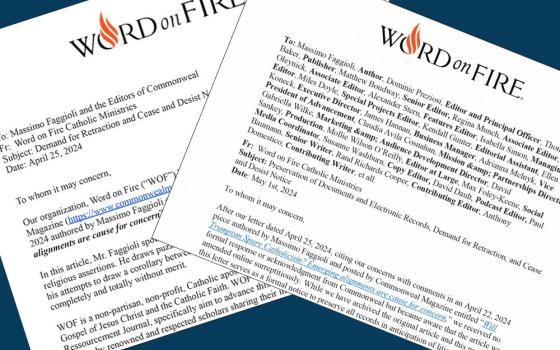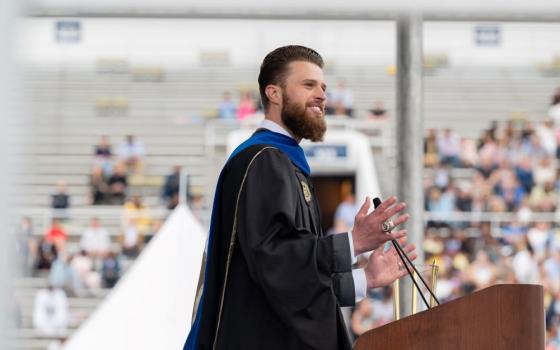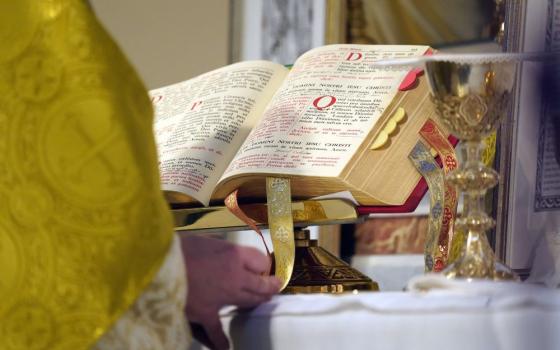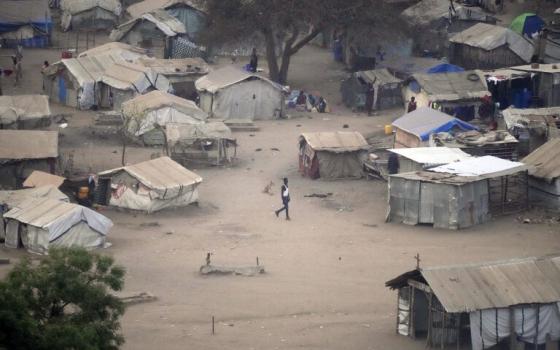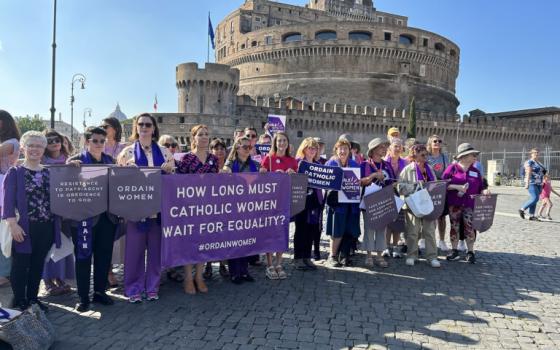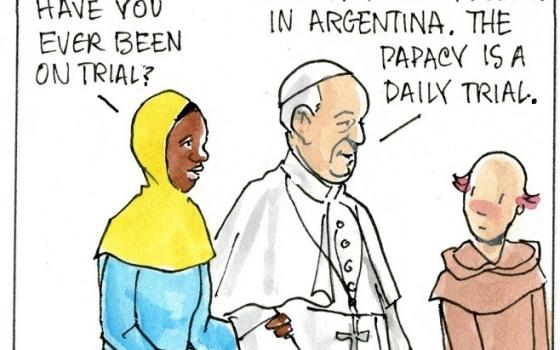Pope Francis kisses his pectoral cross as aides assist in vesting him before formally delivering "Spes Non Confundit," ("Hope Does Not Disappoint"), his document proclaiming the Holy Year 2025, during a ceremony in front of the Holy Door of St. Peter's Basilica at the Vatican May 9, 2024. (CNS/Lola Gomez)
Pilgrims passing through the Holy Door of St. Peter's Basilica during the Holy Year 2025, going to confession, receiving Communion and praying for the intentions of the pope can receive an indulgence, but so can inmates in prison and those who work to defend human life or assist migrants and refugees.
Fasting "at least for one day of the week from futile distractions" such as social media also can be a path toward a jubilee indulgence, according to norms published by the Vatican May 13.
Pope Francis said he will open the Holy Year at the Vatican Dec. 24 this year and close it Jan. 6, 2026, the feast of Epiphany. But he also asked bishops around the world to celebrate the Jubilee in their dioceses from Dec. 29 this year to Dec. 28, 2025.
For centuries a feature of holy year celebrations has been the indulgence, which the church describes as a remission of the temporal punishment a person is due for their sins.
"Every sin 'leaves its mark'" even after a person has received forgiveness and absolution through the sacrament of reconciliation, Francis wrote in the document proclaiming the Holy Year. "Sin has consequences, not only outwardly in the effects of the wrong we do, but also inwardly, inasmuch as 'every sin, even venial, entails an unhealthy attachment to creatures, which must be purified either here on earth, or after death, in the state called Purgatory,'" he wrote, quoting the Catechism of the Catholic Church.
The norms for receiving an indulgence during the Holy Year were signed by Cardinal Angelo De Donatis, the new head of the Apostolic Penitentiary, a Vatican court dealing with matters of conscience and with the granting of indulgences.
The basic conditions, he wrote, are that a person is "moved by a spirit of charity," is "purified through the sacrament of penance and refreshed by Holy Communion" and prays for the pope. Along with a pilgrimage, a work of mercy or an act of penance, a Catholic "will be able to obtain from the treasury of the Church a plenary indulgence, with remission and forgiveness of all their sins, which can be applied in suffrage to the souls in Purgatory."
Advertisement
The Rome pilgrimage, De Donatis said, can be to the papal basilicas of St. Peter's, St. Mary Major, St. John Lateran or St. Paul Outside the Walls. But also to one of the churches connected to outstanding women saints and doctors of the church: St. Catherine of Siena at the Basilica of Santa Maria sopra Minerva; St. Brigid of Sweden at Campo de' Fiori; St. Teresa of Avila at the Church of Santa Maria della Vittoria; St. Thérèse of Lisieux at Trinità dei Monti; and St. Monica at the Church of St. Augustine.
Pilgrims to the Holy Land also can receive the Holy Year indulgence by praying at the Basilica of the Holy Sepulcher in Jerusalem, the Basilica of the Nativity in Bethlehem or the Basilica of the Annunciation in Nazareth.
For those who cannot travel abroad, local bishops around the world can designate their cathedral or another church or sacred place for pilgrims to obtain the indulgence, the cardinal wrote, asking bishops to "take into account the needs of the faithful as well as the opportunity to reinforce the concept of pilgrimage with all its symbolic significance, so as to manifest the great need for conversion and reconciliation."
People who cannot leave their residence — "especially cloistered nuns and monks, but also the elderly, the sick, prisoners and those who, through their work in hospitals or other care facilities, provide continuous service to the sick" — can spiritually join a pilgrimage and receive the indulgence, according to the norms.
Visiting the sick or a prisoner, feeding the hungry, clothing the naked or welcoming a migrant, "in a sense making a pilgrimage to Christ present in them," can be another way to receive the indulgence, the cardinal said, adding that an indulgence could be obtained each day from such acts of mercy.
"The Jubilee Plenary Indulgence can also be obtained through initiatives that put into practice, in a concrete and generous way, the spirit of penance which is, in a sense, the soul of the Jubilee," he wrote, highlighting in particular abstaining on Fridays from "futile distractions" like social media or from "superfluous consumption" by not eating meat.
"Supporting works of a religious or social nature, especially in support of the defense and protection of life in all its phases," helping a young person in difficulty or a recently-arrived migrant or immigrant — anything involving "dedicating a reasonable portion of one's free time to voluntary activities that are of service to the community or to other similar forms of personal commitment" also are paths toward an indulgence, he said.
"Despite the rule that only one plenary indulgence can be obtained per day," De Donatis wrote, "the faithful who have carried out an act of charity on behalf of the souls in Purgatory, if they receive Holy Communion a second time that day, can obtain the plenary indulgence twice on the same day," although the second indulgence is "applicable only to the deceased."
